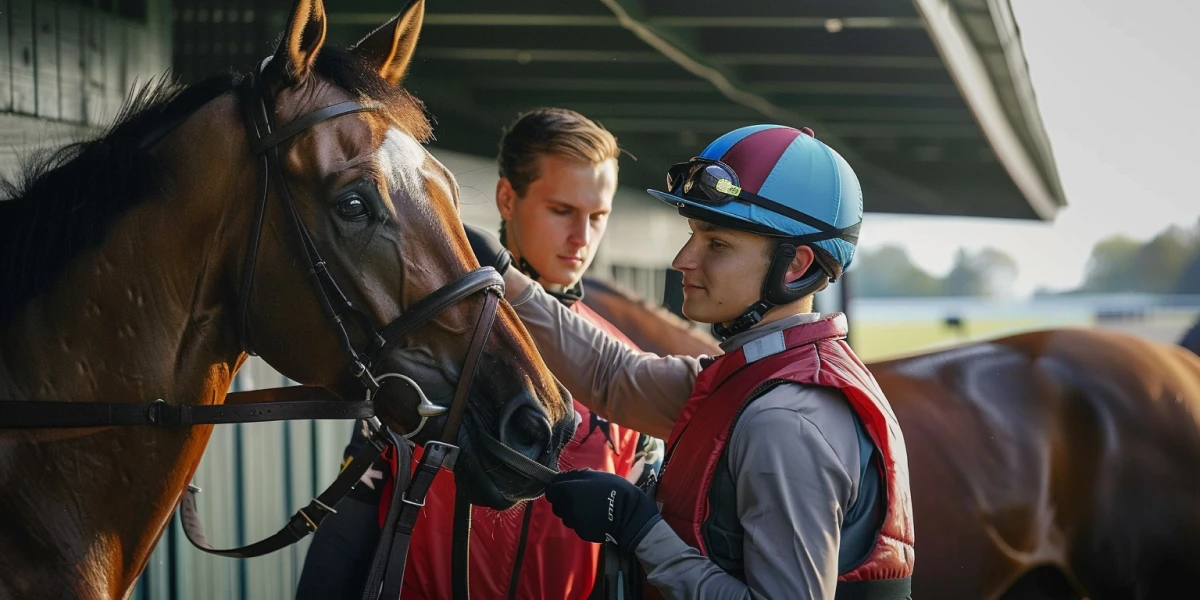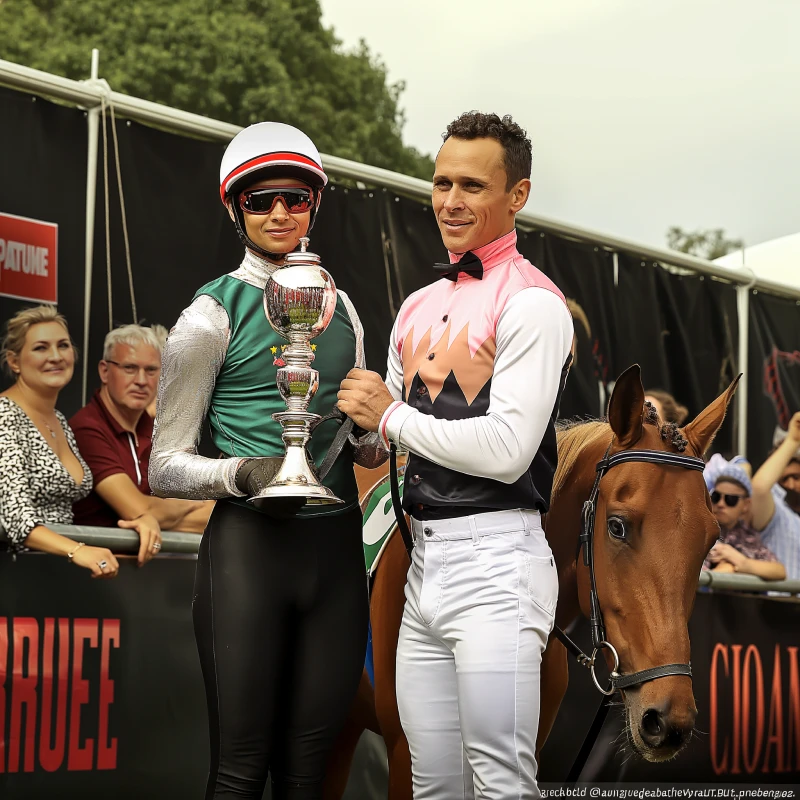Spotlight on Jockeys and Trainers: The Human Side of Horse Racing


1.0
Default
Many will agree that the bond between a jockey and a racehorse is special, and, more often than not, it’s overlooked by many spectators of the sport and horse betting in general. Admittedly, jockeys and trainers don’t just guide these magnificent animals on race day; they spend countless hours building trust and understanding.
They know each horse's quirks and preferences, often forming a connection that goes beyond mere training; much like dating for humans, right? This deep relationship is a key factor in the success of both the horse and the jockey, making every win a testament to their teamwork and dedication.
One of the less talked about chapters of horse racing history is the formation of the Jockeys Community Fund and Guild in 1940. A competitive and beloved jockey by the name of Sammy Renick sustained an injury that led to the real foundation of The Jockeys Community Fund and Guild.
After Eddie Arcaro paid a visit to Renick, who was recovering in the hospital from a broken leg, they had a conversation that resulted in the creation of a group to represent jockeys' interests today. In the fight to be recognized as real athletes, according to the organization's constitution, members had to have a current, unrevoked jockey's license in order to be considered in good standing with the club. It was decided that the new club would charge dues of $30 per year plus 25 cents each month.
How we describe horse jockeys hasn’t always been one thing, but their importance in the world of horse racing is undeniable. These athletes are more than just riders; they're strategists, who understand the nuances of race dynamics and the individual capabilities of their horses.
They have to maintain peak physical fitness to handle the intense demands of racing while also making split-second decisions that can make or break a race. The relationship they build with their horses is essential, often knowing instinctively how to get the best performance out of them. Without the skill and intuition of a jockey, even the fastest horse might not reach its full potential on the track.

Jockeys have a close relationship with their horses and actively participate in their training and recuperation outside of racing days. Building a relationship of trust and understanding with each horse via this involvement is essential, and it can have a big impact on how well the horse performs in competition.
Using their knowledge of the racing course's subtleties and the horse's capabilities, jockeys work closely with trainers and horse owners to create customized race plans. Their role extends to weight management, studying track conditions, and making strategic decisions that align with each horse’s strengths and the dynamics of the competition.
There is a lot to do (and a lot that can go right or wrong) when getting a horse ready for a race. You have to know how to save ground and what position to put your horse in when riding. Do jockeys find it difficult to understand all of this? Yes, although in most jockey colonies, the ratio is probably closer to 5%. It's likely that 20% or so of trainers are ignorant about the process of preparing a horse for racing.
Examining horses who have had jockey changes and trainer changes to see which ones have undergone greater transformation would be a worthwhile experiment. Horses advance up to two or three classes after being claimed by a renowned trainer. Even when a jockey changes, it’s unlikely a horse will go up two or three classes- the chances are typically slim to none.
Jockeys concentrate on aerobic, strength, and flexibility exercises in the days preceding a race to make sure they are at their best on the big day. Because races may be demanding endurance tests requiring sustained bursts of speed over long distances, cardiovascular health is crucial for jockeys.

For jockeys, mental preparation is just as important as physical fitness when it comes to race day. Jockeys can develop their attention, self-assurance, and mental toughness by engaging in mindfulness exercises, meditation, and visualization techniques. On race day, jockeys mentally practice their race plans, picture the track, and picture themselves winning. This creates a winning mentality that helps them perform at their best.
The most significant part of preparing for a race or a horse meet is the last few hours leading up to it, where jockeys and trainers assess strategies and review every aspect of their horse’s health and disposition. This is the small window wherein they can make last-minute changes and address some overlooked concerns that might draw attention during the race.
Trainers give jockeys important information about the temperament, degree of fitness, and preferred racing style of their horses, which helps them adjust their strategy to increase their chances of winning. Needless to say, to achieve the best race performance, jockeys and trainers must work together and communicate well.
The equipment during a horse race plays an elemental role in execution and overall performance. Preparing these tools - including saddles, bridles, helmets, and riding boots, among other things - takes meticulous inspection and fitting while ensuring there are no defects or wardrobe malfunctions.
In order to make sure they adhere to sponsor criteria and racing regulations, trainers and personnel also inspect the state of their racing silks and equipment. When it comes to preparing their equipment, jockeys who pay attention to detail feel more at ease and confident while racing.
A horse jockey and their dedication, skills, and deep bonds with their horses highlight the human side of this competitive sport. Beyond the physical demands and strategic maneuvers, it's the trust and understanding they build with their horses that make a difference. This relationship is often overlooked by spectators and bettors, yet it is the foundation of every race.
In an industry driven by speed and precision, jockeys help bridge the gap between the raw power of the horse and the refined strategies needed for victory. They bring a human element to the forefront, showing that horse racing is not just about competition but also about the connections and teamwork that lead to success.
Read more about the global hotspots of horse betting from our resources at GambleSpot today.

July 26th, 2024
7 Best Horses that Made A Name in Horse Racing
July 24th, 2024
The Role of the Banker in Baccarat - and Why This Could Sway Your Odds
July 19th, 2024
5 Best Slot Games for Art Lovers to Feast Their Eyes on
July 16th, 2024
Fact or Fiction: Pai Gow Edition – What First-time Players Should Watch Out For
July 15th, 2024
Tech and Horseracing: What to Know about Digitizing the Horsebetting Experience
July 9th, 2024
5 Online Casinos with Less than $20 Minimum Deposit You Should Check Out in 2024
July 3rd, 2024
Debunking Common Lottery Myths: What First-time Bettors Should Know
July 2nd, 2024
What to Know About the State of Michigan and Online Poker in 2024
July 1st, 2024
Debunking Common Baccarat Myths: Why You Should Know Better
June 27th, 2024
Understanding the Legal Aspects of Horse Betting in the US: What to Know in 2024Are you sure?
This will delete all chat history, and I will not remember what we were talking about.
✔
Todays Hot Deals